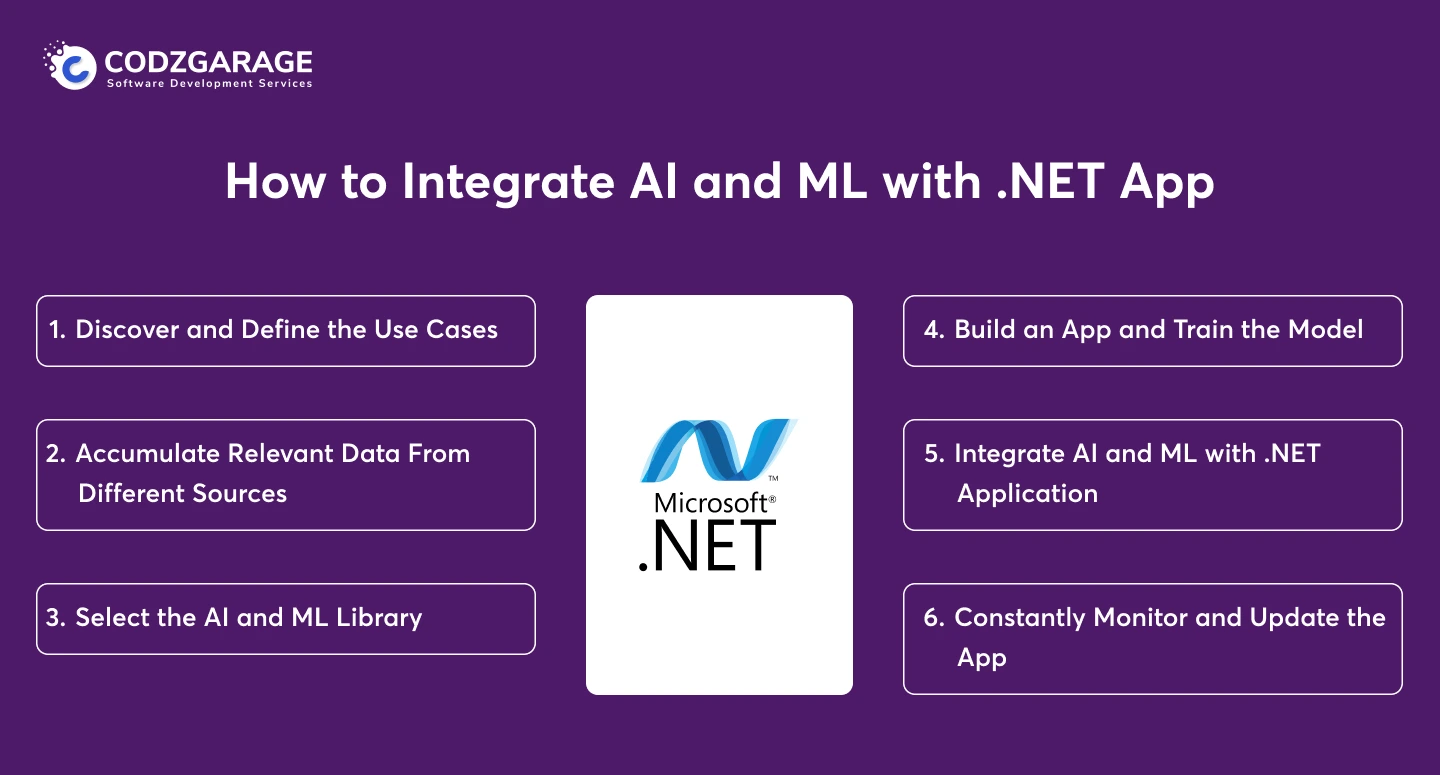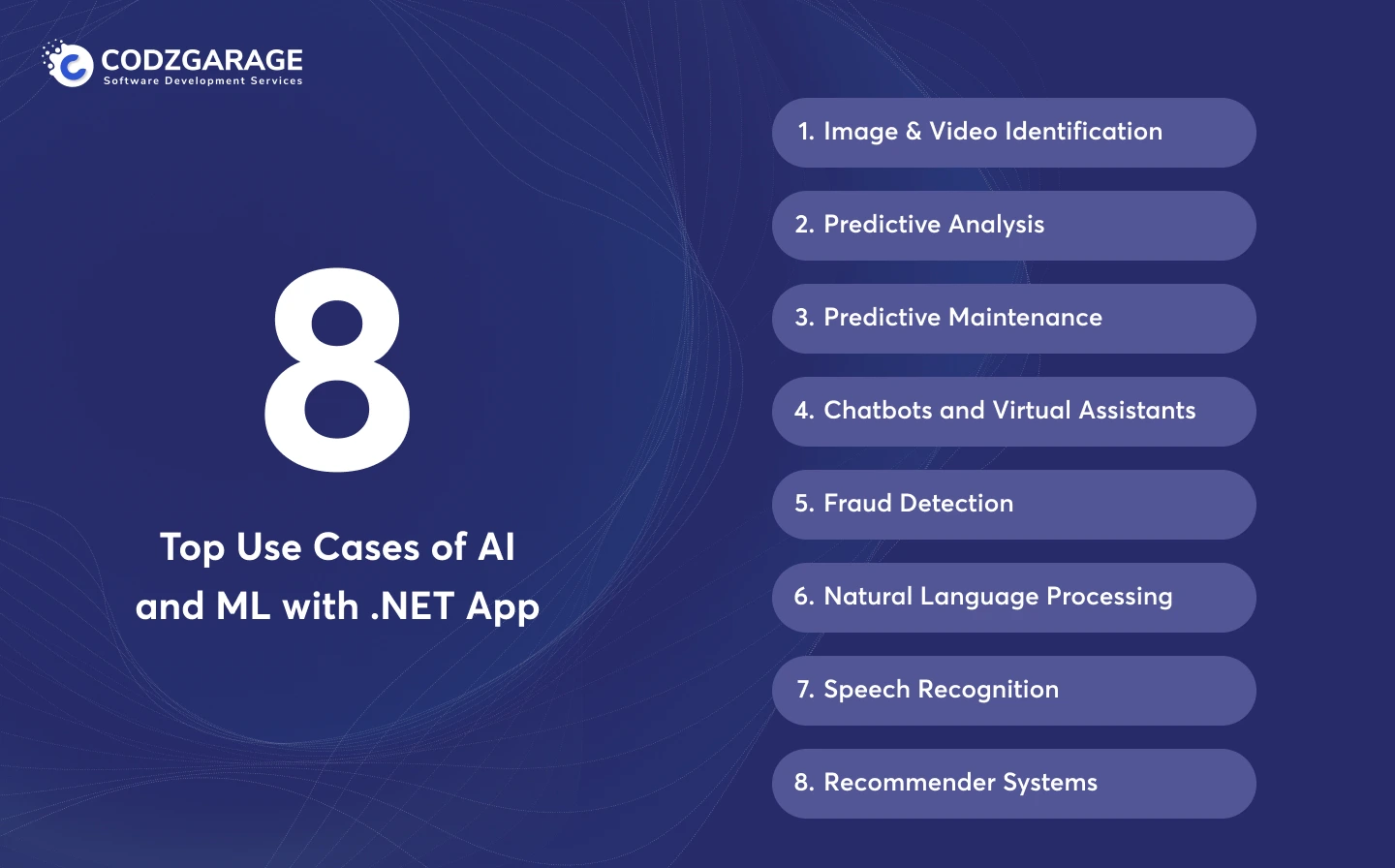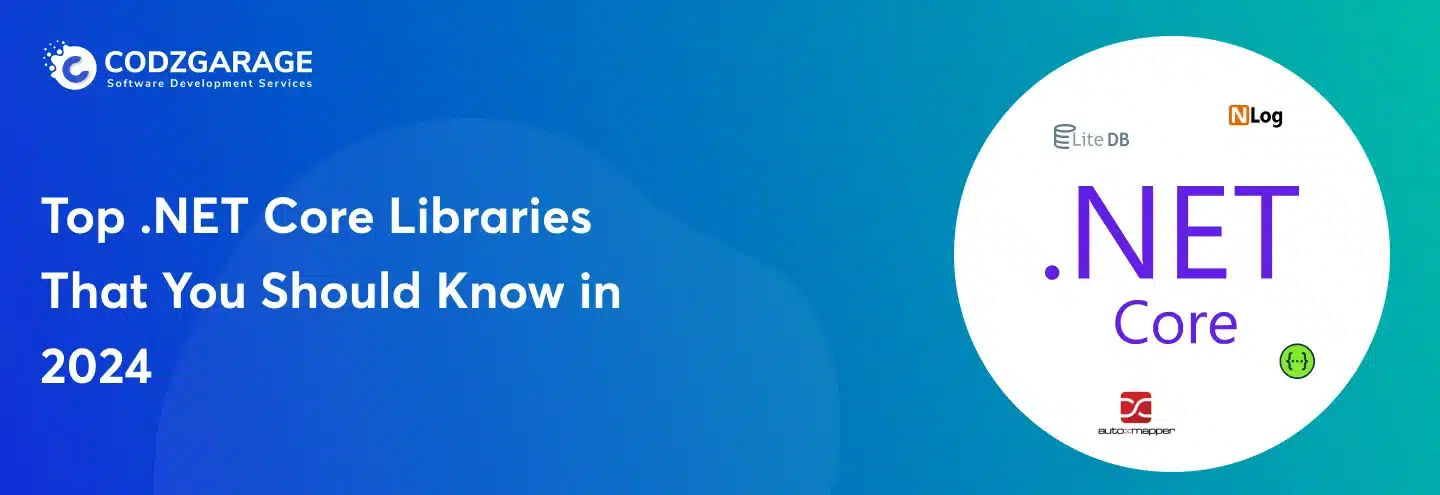-
747
Way to Integrate AI and ML with .NET Applications: A Comprehensive Guide
Want to integrate AI/ML into .NET or .NET Core applications? We have simplified this for you. The article exclusively brings up various points while integrating AI and ML with .NET applications.
Businesses nowadays tend to leverage the potential of AI (Machine Learning) and ML (Artificial Intelligence) with .NET apps to enhance their competencies. If you, too, are one of those, you’re where you should be. In this article, we’ll let you know why and using which approach you can easily Integrate AI and ML with .NET Applications!
Organizations on the lookout for high-performance app development prefer .NET. They rely on .NET because it’s been in existence for more than two decades. The platform offers exceptionally streamlined speed, better stability, robust security, and scalability.
But now, the scenario has changed, and maintaining a stable position in the marketplace is way more competitive. Besides, the stakeholder’s requirements, too, are changing day in and day out. Therefore, utilizing the potential of AI and ML has become the need of the hour.
Do you want to hire dedicated resources with specific integration and customization skills? Codzgarage offers you to hire dedicated developers with good hands-on experience with a bunch of technologies. Contact us now if you have a project to build or want to extend your team with a special skill set.
However, AI and ML integration is quite beneficial; you may not know how to do it! Hence, in this article, we’ve come up with an end-to-end guide on why and how to Integrate AI and ML with .NET Applications, along with the reasons and use cases for a better understanding.
Let’s read between the lines!
Reasons Why Integrate AI and ML with .NET Applications?
However, there can be many reasons why you should incorporate AI and ML into .NET apps. One of the best ways to figure out why artificial intelligence and machine learning should be with .NET is to compare .NET with Python or other tech stacks. Besides, we have given the top reason to help you understand it better.
Process Automation
Process automation is one of the key reasons why you should choose AI/ML integration with your .NET app. Artificial intelligence and Machine Learning assist you in automating repetitive tasks and mitigating errors during execution. Furthermore, the application, based on AI and ML, lets you save money by handling other systems and machinery by making use of a centralized database.
Predictive Assessment
When you integrate AI and ML in .NET Applications, the .NET app will become competent in assessing massive loads of data to detect patterns. Pattern detection is used to anticipate the user’s actions and behaviors on eCommerce stores. For example, when a user comes to a site, ML algorithms assess its behavior and cross-verify it using available data. This enables businesses to predict whether or not a customer will make a purchase.
Personalization
Integrating AI and ML with .NET apps enables organizations to customize a user’s journey by allowing .NET applications to track information relating to the users along with their requirements. It includes interests, demographics, previous history, personal details, and so on. The application shows visitors a range of customized products that suit their needs.
Fraud Detection
Organizations across the globe make use of AI and ML in their .NET applications in which machine learning analyzes the data relating to security threats, attacker behaviors, and the like. After that, AI handles all these processed data and works to strengthen security aspects. This prevents many unwanted occurrences like pushing, credit card fraud, identity theft, and so on. Apart from that, at times, sophisticated attacks, for instance, DDoS and DoS, also get lessened using AI and ML.
Chatbots and Virtual Assistants
When you have AI-powered chatbots and assistants, you’ll be able to enhance user interaction as well as satisfaction rates. Apart from that, you’ll be able to save money as you don’t have to make huge investments to hire support executives. AI-based chatbots enable you to point out users’ queries, assess them, and offer solutions relevant to them. In case a query is out-of-scope, the AI-powered tools make use of additional resources to provide appropriate answers, satisfying users and enhancing traffic.
How To Integrate AI and ML with .NET Applications?

Now that you have got the reasons why you should integrate AI and ML with .NET Apps! Let’s know how to do it!
Discover and Define the Use Cases
Discovering and defining the use cases is the first phase involved with AI and ML integration with a .NET application. When you define the purposes and goals of your project, you have a crystal-clear view of the use case of your .NET application, for example, whether you need AI or ML to implement chatbots, image processing, virtual assistance, automation, decision-making, and so on.
Accumulate Relevant Data From Different Sources
The accumulation of data from different sources is another step of AI and ML integration to your .NET applications. You must train the machine learning algorithm before you conduct its deployment in the real world. Therefore, you need to gather and configure a comprehensive range of datasets for the ML app. Moreover, don’t forget to verify all the information available in datasets intending to ascertain their relevance, accuracy, and timelines.
Select the AI and ML Library
Now, make an appropriate selection of AI and ML framework, library, and toolkit compatible with .NET to make use of in your use cases. TensorFlow, PyTorch, CNTK, ONNX, and the like are some of the high-performance libraries that are preferred by the majority of .NET developers worldwide. Before you select any of these libraries, ensure you have all the software and hardware resources for proper execution.
Build an App & Train the Model
Once you’ve chosen your preferred library, embark on the AI or ML model training. While training, provide all appropriate inputs to the model, and store the outputs. Now, consider a proper assessment of the results and then update them to get expected predictions. Eventually, create a .NET application, conduct testing across the devices, and then make sure it functions as expected.
Integrate AI and ML with .NET Application
Now that the AI/ML model has accomplished the training and you have the outputs in your hand integrate the AI ML model into the .NET application. You can be able to establish an effortless and seamless communication between the .NET application and AI/ML model through a relevant API (Application Programming Interface). Furthermore, make sure you test the compatibility, functionality capability, and performance of the app prior to its launch.
Constantly Monitor, and Update the App
Once you have deployed your .NET application, it doesn’t mean you have done that forever. Even if you have deployed the .NET application, you need to monitor it for quality performance and high-speed functionality. When you find any bug keeping your application from functioning properly, fix them before they have any consequence on it. Apart from these, don’t forget to feed the application with additional data so that it can remain updated and receive ample outputs.
AI and ML Libraries and Frameworks Compatible with .NET
Although there are plenty of AI and ML libraries and frameworks compatible with the .NET platform, which one you employ will immensely depend upon your project requirements, for instance, the ML model you’re willing to create or the AI feature you like to integrate with the app. Take a look at the AI and ML frameworks and libraries you can make use of to infuse into your .NET application.
PyTorch
PyTorch is one of a kind, well-known, and open-source machine learning library which offers its users a convenient and intuitive interface to create and train AI models. PyTorch is used widely for computer versions, natural language processing, and other AI applications.
ML.NET
Created by Microsoft, ML.NET is another open-source and platform-agnostic machine learning framework that offers a set of APIs and tools to create and deploy AI models in .NET apps.
TensorFlow
Another open-source machine learning framework in the list is TensorFlow. Developers use it wisely to create and deploy AI models. The platform provides an extensive range of tools for ascertaining the seamless creation and training of complex machine-learning models.
Accord.NET
Up next, we have Accord .NET. It’s a machine learning framework for .NET, which offers an extensive range of tools and algorithms to create and deploy AI models.
CNTK
Now, we have CNTK (Microftware Cognitive Toolkit), another open-source framework providing a comprehensive range of tools for building and training even complex AI models.
AForge.NET
AForge.NET is another open-source framework for artificial intelligence and computer vision that offers a complete set of tools and algorithms, making use of which you can create and deploy AI models in .NET applications at your convenience.
Some Use Cases of AI and ML with .NET apps

We discussed why and how to integrate artificial intelligence and machine learning into your .NET applications with a brief glance at the most used frameworks and libraries compatible with .NET; let’s have a look at some of the use cases of AI and ML with .NET apps!
Image & Video Identification
Now, you can make use of AI and ML to identify and classify videos and images, for instance, identifying humans and objects in photographs.
Predictive Analysis
You can make use of AI and ML to assess data and make anticipation regarding future trends, including customer behavior, sales trends, and the like.
Predictive Maintenance
The use of AI and ML makes it way more convenient than ever to anticipate the requirements for systems and equipment. It mitigates the need for human interventions in monitoring and enables companies to proactively identify potential issues so that they can troubleshoot them in time.
Chatbots and Virtual Assistants
By enabling AI-powered chatbots and virtual assistants, you can ensure your customers, along with employees, have constant assistance, which results in a mitigated need for human staff to support.
Fraud Detection
The use of AI and ML is likely to be used to recognize and keep fraudulent activities like credit card fraud, industry theft, and other finance-related fraud at bay.
Natural Language Processing
Now, organizations can employ AI and ML to assess and understand human language, for example, sentiment analysis or text classification.
Speech Recognition
Using AI and ML, you can now identify and transcribe speech for voice-controlled applications.
Recommender Systems
You can make use of AI and ML to create recommender systems that ensure offering specific recommendations to users depending on their behavior and preferences.
Signing Off…!
That’s all there’s to it! Before you head up to integrate AI and ML with .NET applications, you need to have an understanding of the different libraries as well as the use cases so that you can make the most out of it. In this article, we discussed everything from the basics, including the reasons, the ways, the AI, ML framework, and libraries compatible with .NET as well as the use cases so that you get end-to-end know-how on how to integrate AI and ML with .NET apps. So, now you know everything needed about AI, and ML integration to .NET applications, get connected to a .NET development company to grasp complete solutions.
FAQs
.NET applications are likely to incorporate AI and ML, making use of pre-build frameworks and libraries, for instance, Scikit-Learn, TensorFlow, or bespoke models by utilizing ML.NET.
Yes, for sure! .NET developers can make use of programming languages like F# and C# to create custom AI and ML algorithms and integrate them with .NET applications. Besides, it enables .NET developers to build requirement-specific applications using .NET.
Yes! There’s a multitude of Microsoft Libraries and Frameworks out there that you can make use of to integrate .NET apps. Have a look at a few of them!
- Microsoft Azure Machine Learning.
- Microsoft Cognitive Services.
- .NET for Apache Spark.
- ML.NET
- Accord.NET
- TensorFlow.NET
When you incorporate AI and ML into .NET apps, you’re likely to embrace plenty of benefits. It’ll automate manual activities and enhance competencies in data assessment and prediction while enhancing user experience. With data analysis, organizations will be able to make better decisions at their convenience.
Want
to Build Custom App?We Excel In
- Software Migration
- Web App
- Mobile App




 Kevin Bhut
Kevin Bhut 







